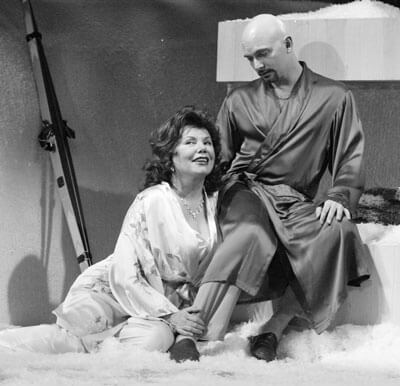Charles L. Mees’ new comedy is ready to wear out
Charles L. Mee’s new comedy at the Second Stage Theatre is a pret-a-porter romance. Well-suited for any occasion, it could play anywhere. To savvy audiences, however, it’s an insult.
Not the least the play’s problems is its star, a cosmetically reconstructed Marsha Mason, Hollywood’s perennial girlfriend. As Maria, Mason is an over-the-hill sexy wife to her bisexual husband, Frank, played by the feckless Nicholas Hormann, and also the lover of gigolo Francois, played by Michael Cerveris with an accent as thick as bad foie gras. Mason is also a mother––all the more grist for the mill.
Left in the hands of this unhappy cast and its clueless director, David Schweizer, lovemaking leads to a morality lesson. Ouch! So, as things converge, the characters collide, chasing each other around, semi-naked, into the snowy woods, in a desperate imitation of bad 18th century French comedy, rife with stock characters, embarrassing coincidences, and quid pro quos. Aimless amusements––revolving doors and crashing glassware––shock free, but full of schlock.
If only they had really tried to imitate Moliere, or even Marivaux or Beaumarchais––but this! This is intolerable. A slew of caricatures. The only actor here who gives us anything believable is T. Scott Cunningham as Frank’s lover. And he’s the only one who, in the final analysis cares about Maria.
Adding to the confusion, a cliché of a lesbian couple, bickering and sexless, bursts onto the scene in need of romantic repair. That apparently explains the arrival of the doctor, Jacqueline (Tina Benko), possessing an accent that’s as poor and nondescript as Mason’s so-called Italian one.
The plot ends in a deus-ex-machina, foreshadowed by the appearance of the compost delivery man, Bob (Danny Mastrogiorgio), who also stands in as the weekend priest.
To keep the story moving, blasts of opera play through the action in what starts out as a terrific sound design by Eric Shim, but which grows increasingly more agitated as the actors begin lipsynching. Sadly, the highlight of this production is “Wintertime”’s snow white set by Andrew Lieberman with the wooded exterior blending into the all-white contemporary interior, naked unto itself.
The play’s romantic proposition if a morality lesson about the ability to love, “the need to give your heart to someone else,” and the capacity to trust another person. Needless to say, love’s labors are resolved in the end, young lovers are reunited, and their elders are free to fulfill themselves in a “politically correct” 21st century way. Ouch again.



































